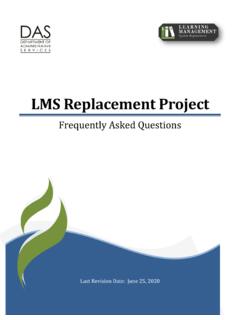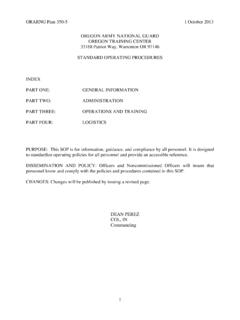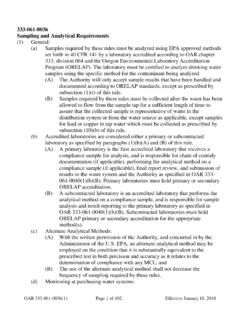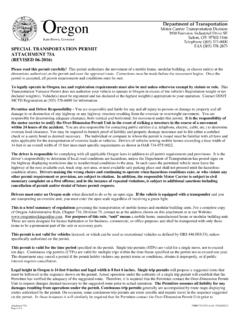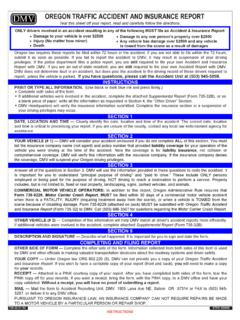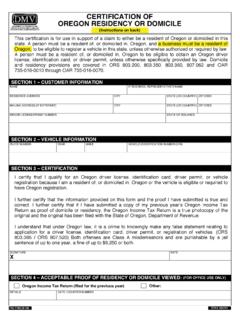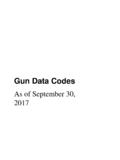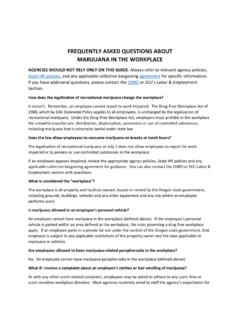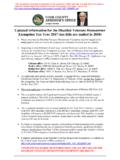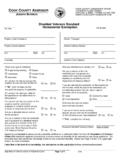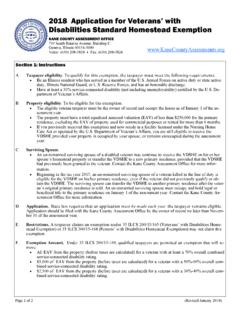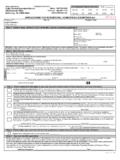Transcription of Disabled Veteran or Surviving Spouse Exemption …
1 150-303-086 (Rev. 12-15) Disabled Veteran or Surviving Spouse Exemption Claim (Page 1 of 5) Disabled Veteran or Surviving Spouse Exemption Claim[Oregon Revised Statute (ORS) ]Instructions Complete either Part 1 or Part 2 of this claim form on page 2, not both. See pages 4 and 5 of this form for further filing instructions. File this form with the county assessor on or before April 1, to claim a property tax Exemption on your primary residence for the following tax year, beginning July 1. If you acquire property after March 1 but before July 1, file this form within 30 days of acquisition. If you are a Disabled Veteran , you must attach your discharge papers (DD 214 or other equivalent documentation) showing your period of active service and conditions of release or discharge from the military.
2 You must also attach your disability certificate. See Part 1 of the instructions on page 4 of this form for more information. If you are a Surviving Spouse or registered domestic partner (partner), you must attach proof of marriage/registered domestic partnership (partnership) to the deceased Veteran , the Veteran s death certificate, and the Veteran s military discharge or release papers (DD 214 or other equivalent documentation). You also can t have entered into a new marriage or partnership. See Part 2 of the instructions on page 5 of this form for more information. If you are the Surviving Spouse /partner of a qualified Veteran who died during the prior tax year, file this form with the county assessor any time during the current tax year. See Part 2 of the instructions on page 5 of this form for more information.
3 This form is available online on the Department of Revenue s website at: If your property is held in a trust, it must be a revocable trust and you must submit the trust allows a portion of the assessed value of your property to be exempt from taxation. You must be an Oregon resident, own and live in your own home, and it must be your primary 1 Claim for Exemption by a qualified Disabled veteranORS grants an Exemption to any qualified Disabled Veteran . You must have been a member of and discharged or released under honorable conditions from the Armed Forces. You must have completed a minimum period of active service. You must also be certified as having disabilities of 40 percent or more. See Part 1 of the instructions on page 4 of this form for more either Section A or B.
4 Check the boxes that apply to I am a Veteran that was discharged under honorable conditions and have a disability rating certified by the Depart-ment of veterans Affairs or the Armed Forces. (You don t have to file every year. If any qualifying conditions change, you must file a new claim to continue your Exemption .) 1. I have disabilities of 40 percent or I have service-connected disabilities of 40 percent or I have attached my disability certificate and it is dated within three years of this I have previously filed my disability certificate and don t need to file it now because I filed it after reaching the age of 65 or I am certified permanently I am filing within six months of the date the Department of veterans Affairs or a branch of the Armed Forces notified me of a certified disability rating of 40 percent or more.
5 I may claim up to three prior tax years plus the current tax year. (Note: The earliest year of Exemption is the tax year following the effective date of your certified disability.)For Assessor s use onlyDate receivedBriefly give reason for denialApprovedDeniedReceived byLate filing fee paid$MapAccount numberCheck number I am claiming an Exemption for the tax year starting July 1, addressStateCityZIP codeLocation of property for which Exemption is sought (street address)StateCityZIP codeClaimant sectionCounty where home is locatedName of claimantBefore you mail your claim form, make sure you: Complete pages 1 and 2 of the form. Sign your claim form. Attach a copy of the required your claim form and attachments to your county account number150-303-086 (Rev.)
6 12-15) Disabled Veteran or Surviving Spouse Exemption Claim (Page 2 of 5)Signature of Disabled veteranDatePhoneSignature of Surviving Spouse /partnerDatePhoneXXB. I am an honorably discharged Veteran who is certified by a licensed physician. You must file every year. Your total gross income can t be more than 185 percent of the annual federal poverty guidelines. 1. I have disabilities of 40 percent or I have attached my physician s certificate and it is dated within one year of this claim, or2b. I have previously filed my disability certificate and don t need to file it now because I filed it after reaching the age of 65 or I am certified permanently My total gross income received from all sources during the last calendar year is $ Number of family members in household (including myself, Spouse /domestic partner and dependents)_____.
7 Part 2 Claim for Exemption by a Surviving Spouse or partner* of a qualifying veteranORS grants an Exemption to any qualified Surviving Spouse /partner of a Veteran . To qualify, you can t have entered into a new marriage or partnership. The deceased Veteran must have been a member of and been discharged or released under honorable conditions from the Armed Forces and have completed a minimum period of active service. See Part 2 of the instructions on page 5 of this form for more the boxes that apply to I am a Surviving Spouse /partner of a qualified Veteran . You don t have to file every year. If any qualifying conditions change, you must file a new claim to continue your Exemption . 1. I haven t entered into a new marriage or The qualifying Veteran died of service-connected injury or The qualifying Veteran received the maximum Exemption for at least one My homestead was acquired after March 1 but prior to July 1 and the qualifying Veteran died within 30 days of the I am a pensioned Surviving Spouse of an honorably discharged Veteran of the Civil War or the Spanish I am filing for the first I have filed before in _____ declare under penalties of false swearing [ORS (4)] that I have examined this document and attachments, and to the best of my knowledge, they are true, correct, and complete.
8 * Partner means an individual joined in a domestic partnership and registered in Oregon under ORS Email address (optional): (Rev. 12-15) Disabled Veteran or Surviving Spouse Exemption Claim (Page 3 of 5)Physician s Certificate for Disabled Veteran s Property Tax ExemptionI, _____, do hereby certify that I am a physician duly licensed to practice in the state of _____, and that I have examined _____ this _____ day of _____ 20_____ and find him/her _____% Disabled as provided by ORS (2)(b).Physician _____150-303-086 (Rev. 12-15) Disabled Veteran or Surviving Spouse Exemption Claim (Page 4 of 5)Instructions for Disabled Veteran or Surviving Spouse Exemption ClaimORS allows a portion of the assessed value of a dis-abled Veteran s or a Veteran s Surviving Spouse s/partner s residential property to be exempt from property tax.
9 The Exemption amount increases by 3 percent each year. You must own and live in your home before July 1 to qualify for the Exemption for the tax year beginning July 1. Also, if you sell your home before July 1, the property becomes disqualified for the tax year beginning July 1. To claim this Exemption , a qualified Veteran or their Surviving Spouse /partner should file a Disabled Veteran or Surviving Spouse Exemption Claim, 150-303-086, along with the required documentation. Read below for more information and filing 1 Qualified Disabled veteranHow do I qualify for the Exemption ?You are eligible for this Exemption if you are an Oregon resident who: Owns and lives in your home; Is a Disabled Veteran certified as having disabilities of 40 percent or more by either: The Department of veterans Affairs; Any branch of the Armed Forces; or An independent licensed Disabled Veteran who has service-connected disabilities of 40 percent or more is entitled to a larger Exemption amount.
10 If you are an honorably discharged Veteran who is officially certified by the Department of veterans Affairs or the Armed Forces, you don t have to file every year. You must file a new claim form by April 1 and attach your dis-ability certificate that s dated within three years of the claim if there are changes in ownership or use of your homestead property. For example, if you transfer your homestead prop-erty to a trust or life estate, you may have to file a new claim. Other changes in ownership, such as adding or removing another to the deed or changing the proportions of owner-ship of existing owners may require you to file a new your homestead property is held in a trust, the trust must be clearly identified as revocable. To receive an Exemption on your homestead property, you must retain sufficient rights to your property and continue to live there.
